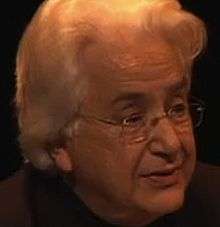Islamic Reformism
| Part of a series on |
| Islam |
|---|
 |
|
Related topics |
|
Reform Muslims, like their more orthodox peers, believe in the basic tenets of Islam, such as the Six Elements of Belief and the Five Pillars and they consider their views to be fully compatible with Islam. Their main differences with more conservative Islamic opinion are twofold. The first lies in differences of interpretation of how to apply the core Islamic values to modern life, the second a more reactionary dialectic which criticizes traditional narratives or even rejects them, thus denying any obligation to follow them while also allowing greater freedom in interpreting Quran regardless of the hadith.
Muslim intellectuals who have focused on religious reform include Muhammad Ali, Sayyid al-Qimni, Irshad Manji, Nasr Abu Zayd, Khalil Abdel-Karim, Abdolkarim Soroush, Mohammed Arkoun, Mohammed Shahrour, Ahmed Subhy Mansour, Edip Yuksel, Gamal al-Banna, Abdullahi Ahmed An-Na'im, Muhammad Tahir-ul-Qadri,[1] Javed Ahmad Ghamidi, Ahmed Al-Gubbanchi, Mahmoud Mohammed Taha, and Faraj Foda. Taha was hanged in 1985 under the sharia regime of Jaafar al-Nimeiri[2] and Foda was assassinated in 1992 by al-Gama'a al-Islamiyya.[3]
Islamic Protestantism has also been used to describe movements advocating for reformation in Islam, on a parallel to the Protestant Reformation.[4]
Parallels between Islam and Protestantism have long been made. Some thinkers of the Enlightenment "tended to make Mohammed almost a good Protestant and in any event a perceptive opponent of the Curia Romana".[5]
The Iranian author Hashem Aghajari argued for Islamic Protestantism in 2002, as a criticism of the theocratic Islamic state, describing it as: "A rational, scientific, humanistic Islam. It is a thoughtful and intellectual Islam, an open-minded Islam."[6] However, he uses the term Protestantism to mean "a progressive religion rather than a traditional religion that tramples people," which has been said to bear little resemblance to Protestantism in its original form.[7]
Professor Mohammed Arkoun (1 February 1928 – 14 September 2010) was an Algerian scholar and thinker of Kabyle descent. He was considered to have been one of the most influential secular scholars in Islamic studies contributing to contemporary intellectual reform Islam. In a career of more than 30 years, he had been a critic of the tensions embedded in his field of study, advocating Islamic modernism, secularism, and humanism.[8]
See also
References
- ↑ Bennett, Clinton; Ramsey, Charles M. (2012). "When Sufi tradition reinvents Islamic Modernity; The Minhaj al-Qur'an". South Asian Sufis: Devotion, Deviation, and Destiny. Great Britain: Bloomsbury Academic. ISBN 978-1472523518.
- ↑ Packer, George (11 September 2006). "The Moderate Martyr - A radically peaceful vision of Islam.". The New Yorker. Condé Nast. Retrieved 2 December 2015.
- ↑ "DOCUMENT - EGYPT: HUMAN RIGHTS ABUSES BY ARMED GROUPS". amnesty.org. Amnesty International. September 1998. Retrieved 2 December 2015.
- ↑ Browers, p.1
- ↑ Kenneth M. Setton Western hostility to Islam and Prophecies of Turkish Dooom 1992, p.54, quoted in Browers, p.2
- ↑ Browers, p.1
- ↑ Reformist Voices of Islam: Mediating Islam and Modernity, Shireen Hunter
- ↑ Mohammed Arkoun:A Modern Critic of Islamic Reason
Further reading
- Michaelle Browers, Charles Kurzman An Islamic reformation? Lexington Books, 2004 ISBN 0-7391-0554-X
- Vanessa Martin Creating an Islamic state: Khomeini and the making of a new Iran I.B.Tauris, 2003 ISBN 1-86064-900-9
